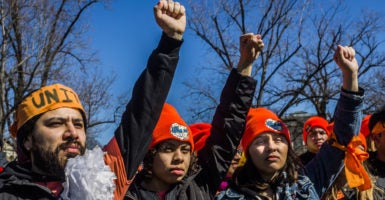This is a lightly edited transcript of an interview on The Daily Signal podcast Monday. Since the interview was recorded, House GOP leadership announced there will be a vote on the Goodlatte-McCaul bill in June.
Katrina Trinko: Immigration was supposed to be dead as an issue, but in recent weeks a number of Republicans have decided to use a complicated maneuver to try to force a vote in the House on immigration. Essentially, if 25 Republicans sign a discharge petition, and all the Democrats join them, and then on very specific days they could in fact force an immigration vote.
On Fox News, House Majority Whip Steve Scalise warned against the maneuver recently, saying, “I don’t want to see this discharge petition moved because I want to solve the problem. … President Trump said he actually wants to solve this problem, and we’re working with President Trump to get a solution, but blanket amnesty with no border protection and no wall is not the answer.”
So joining us here to explain is Tommy Binion, who is the director of congressional and executive branch relations at The Heritage Foundation. Tommy used to work on the Hill himself … Tommy, first off, explain to us why a discharge petition could force a vote even though House GOP leadership doesn’t want an immigration vote.
Tommy Binion: Well, that’s the rule. There is essentially a House rule meant to protect the rank and file that says if you get 218 members of Congress to sign the discharge petition, then you can get a vote on something. It’s sort of a fail-safe in the House.
It’s viewed as a really aggressive anti-leadership move for Republicans, members of the majority party, to sign the discharge petition, but nonetheless it happens, rarely, but it happens, and it’s happening in this case.
As of now, 20 Republicans have signed a discharge petition. The discharge petition, in and of itself, is not all that complicated. If 218 members of the House sign it, they’re going to get a vote on whatever it discharges.
In this case what it discharges is a little complicated. It’s called a “Queen of the Hill” rule. So in the House, just about every day, the House passes a brand new rule that’s specific to a bill they want to consider. That’s their way of doing business in the House, that they adopt a new rule for every bill they want to consider.
The discharge petition would actually discharge a new rule that would get you four votes on DACA [Deferred Action for Childhood Arrivals], immigration-related bills, and whichever of the four, as long as it had a majority, had the most yes votes, would then be considered as adopted by the House.
So it’s setting up an amnesty DACA floor vote, actually four of them, and a prolonged debate on the merits of codifying DACA into law.
Daniel Davis: So Tommy, who are some of the lead Republicans behind this, and why do you think they’re doing this now? Undercutting leadership at such a critical time.
Binion: Well, so one of the lead members is actually somebody who’s gone now, but his signature still counts. This is one of the most outrageous parts of this experience. [Former Rep.] Charlie Dent signed the discharge petition, has now resigned from Congress, but he still counts. His signature still counts.
Davis: Why does it still count? You have to have been a member at the time of signing it?
Binion: That’s right. If and when there is a replacement for his seat, that person could take his name off of it, but until then it stays. And what was the second part of your question?
Davis: Oh, just why would they possibly want to undercut their party at such a critical time?
Binion: I don’t want to speak for them. I think their logic is faulty. After all, in my viewpoint, the worst thing for Republicans to do in an election year is spend the summer before the election talking about how many people they want to give amnesty to. It’s certainly not a way to turn out the conservative base in the November elections. I think it’s a very dangerous thing.
There’s a handful of Republicans who I think in a misguided way think they need to vote for amnesty in order to get re-elected. As we know, in an election year in Congress, it’s politics and polls that are driving the behavior and the fear of losing, and this is certainly no exception to that.
Trinko: Republican leadership has been very open about how they are opposed to this maneuver. Do they have any options if it gets to 25 Republican signatures?
Binion: So typically what happens is when a discharge petition gets close, and I would qualify this as pretty darn close, to getting the 218 necessary signatures, the speaker or the majority leader will give the signers of the discharge petition something along the lines of what they’re asking for in the discharge petition, but probably not all of it.
So it’s not in the speaker’s interest to let this happen. It’s a pretty big blow to his power. One discharge petition working will beget five more. There’ll be more of these types of efforts, and it will not be a good thing for the speaker’s power in the House. So he’s interested in heading it off. So what’s he do? He offers himself.
In this case what they want is a vote on amnesty, and so the Goodlatte bill, which is a bill that’s been around for six or eight months now, codifies DACA into law, and it does, as Whip Scalise was talking about in that Laura Ingraham video, it does a handful of other things along the lines of immigration enforcement.
So maybe the speaker will give these folks a vote on Goodlatte. I have a feeling that the Goodlatte bill, on its own, won’t be good enough for them. I think that they’ll have to tweak the Goodlatte bill, but I think the best case scenario is for them to handle this quickly and quietly and without advancing the cause of amnesty for … millions of illegal immigrants.
Davis: So obviously this is the House. If a bill passes, then the Senate would be able to consider it, but that’s a completely different question. Isn’t this really all dead in the water in the end, if the Senate decides not to take it up and if the president certainly decides not to sign it?
Binion: Yeah, that’s true, but I don’t think that that would happen. So I’m worried, and many others are worried, if an amnesty bill were to get that much traction that it passed the House, there’d be a lot of incentive for the Senate to move it.
Certainly the Senate, I think, they had that series of four votes on DACA-related measures earlier in the year in February. None of them garnered the votes to pass, but something this close to an active and having passed the House might have a better chance in the Senate. So I think the House is way more conservative than the Senate, and it would be far better to stop it in the House than to bank on it stopping in the Senate.
Trinko: Right, especially because, at least in recent years, it seems the Senate’s been a lot more involved in immigration from Gang of Eight to other endeavors. Tommy, what, in an ideal perfect world, would conservative lawmakers be doing on immigration right now?
Binion: They would be focusing on, I think, the problems in the most reasonable order. It makes the most sense to attack border security first. We have an illegal immigration problem in this country. It’s an economic problem. It’s a rule of law problem. It’s a national security problem. And we need to stop it from getting any worse, and the only way to do that is to secure the border.
When the border is secure, then we need to work towards interior enforcement. We have millions of illegal immigrants in this country currently, working, paying taxes on a stolen Social Security number. Those things cause problems. We need to enforce the laws that are currently on the books.
Once you have border security taken care of and illegal immigration taken care of, you should fix the legal immigration system. You should align the legal immigration system with the interests of Americans, with the interests of the nation. We should be letting in the most qualified immigrants on a legal basis.
Once you have those things taken care of, then it would be in order to bring up the problem that is the people that are already here, but until you can do those first three things, it makes no sense to talk about the illegal immigrants that are already here.
Furthermore, when you start there, when you start at amnesty, it makes the other three problems worse. When you say, “Let’s give these 11 million people amnesty,” it puts more pressure on the border because people want to come when they think they’re going to get amnesty. It makes interior enforcement harder to do. One, it hurts the morale of [Immigration and Customs Enforcement], but two, it complicates illegal enforcement structure.
DACA extremely complicated the illegal enforcement structure … I heard today that one of the things that happens is somebody will get arrested and then they’ll claim that they are eligible but haven’t yet applied for DACA and it will allow them to be released from custody. So these are problems caused by the fact that here in Washington, for a certain segment of our politicians, amnesty or talking about amnesty helps them politically, but it certainly hurts us from a policy standpoint.
Davis: All right, well Tommy, this is really a helpful breakdown. Thanks for being on the show for the first time. We hope to have you back soon.































